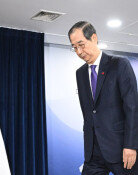N. Korea’s elite defectors working at NIS increases during Yoon administration
N. Korea’s elite defectors working at NIS increases during Yoon administration
Posted January. 12, 2024 07:37,
Updated January. 12, 2024 07:37
It was reported that the number of elite North Korean defectors hired by the Institute for National Security Strategy (INSS), a national research organization under the National Intelligence Service, has increased more than four times since the Yoon Suk Yeol administration began compared to the number of those employed under the previous administration. Likewise, at least 18 North Korean defectors have been hired by advisory and affiliated organizations under the Ministry of Unification since the inauguration of the incumbent administration. Around 10 North Korean defectors who had been the elite came to the South last year, considerably up from a couple of such high-class defectors who fled the regime amid the COVID-19 pandemic. The Yoon administration attributes such an uptick in the number of North Korea’s elite defectors to the fact that there have been great improvements in how they are treated since it was inaugurated.
Since President Yoon took office in May 2022, the INSS has hired more than 20 North Korean defectors who belonged to the elite class or are specialized in expert fields as full-time and part-time researchers and other posts, according to the agency. “Only five elite North Korean defectors worked at the institution under the Moon administration. There has been more than a four-time increase since then,” said an insider. Reportedly, the defectors working at the INSS include diplomats and high-ranking officials who had worked at North Korean agencies handling issues with South Korea. They help look into the realities of North Korean society and analyze the state of affairs. With the current administration raising awareness of improving North Korean human rights, the research institute created the Center for North Korean Human Rights under the Office of Korean Unification Studies this year.
“We found that the Moon administration failed to capitalize on the experience and expertise of high-class North Korean defectors,” said a government official. “Some of them financially struggled since they couldn’t get a job in South Korea.” For example, the INSS under the previous administration dismissed Kim Deok-hong from an advisor post. He served as deputy director of North Korean Workers’ Party archives before defecting to the South in 1997 along with the late Hwang Jang-yop, former chairman of the Supreme People's Assembly.
This year, the South Korean Ministry of Unification employed six North Korean defectors as part of its policy advisory committee, which consists of 97 members. Around the late period of the former Moon administration, the committee had only two members who defected from the North. Two of the ministry’s advisory agencies, which were launched last year – a committee for unified future planning and one for North Korean human rights – have six and three North Korean defectors, respectively. Under the unification ministry, the National Institute for Unification Education, where only one North Korean defector worked in the Moon administration, has added two more hires to its workforce to work with three professors who defected from the North. Ko Young-hwan, former INSS vice president who became the first North Korean diplomat to defect to the South, was assigned as a special advisor for the unification minister in August last year.
“A growing number of elite North Koreans are becoming aware that the current South Korean administration gives better treatments for North Korean defectors,” said a senior government official. “We are told that even North Korean diplomats and trade representatives working overseas have heard about the changes from high-class North Korean defectors residing in the South.”
Kyu-Jin Shin newjin@donga.com







